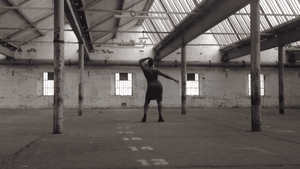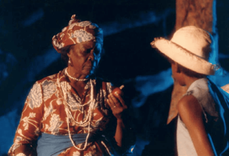Watchlist
Watchlist is a series of screenings prompted by the video and film research of an artist

This iteration begins from a longlist of works shared by Onyeka Igwe with Watchlist programmers Clémence Lollia Hilaire and Daisy Smith. In the three chapters of the screening programme, a selection of Igwe's video work is paired with video works echoing with her practice.
Screening 1:
April 25, 17:00-19:00h
Book tickets
the walls have mouths, Onyeka Igwe 5'02"
West Indies, Med Hondo 110"
Med Hondo uses the meaning of an indoor stage to recast centuries of history and relations between the french west indies and the french ‘main land’. West Indies collapses histories and geographies into the same stage set. Here, the psychological relation between the West Indians as they consider France and the promise and suspicions it holds in regards to its recurring extractive and exploitative politics is examined.
Following this, we will look at a somehow different stage.
the walls have mouths by artist Onyeka Igwe was filmed during a visit to the Former Empire and Commonwealth Collection Archive in Bristol. Igwe was employed to sift through decaying film canisters in order to digitise them. From a stifling basement of this so-called archive, her and her colleague enter a wide open and empty top floor. Here she is not touching mouldy film strips nor viewing violent colonial images, rather she is free to articulate her own movements, reminiscent of dancing among friends. the walls have mouths is a work that draws attention to how a building erected to serve a colonial system can itself speak. It is designed to encapsulate the purpose of an archive to colonialists - to perpetuate violence and exploitation. In the remains of what was once the stage of constructed and reductive images, a body is introduced, a embodied perspective:
“I know that in those moments I felt light, or lightened.
There is a moment that stains the memory of the experience - I outstretch my arms, incrementally, to a wingspan that it is odd to see myself possess and I drink in this width like a large exhale, finding space in depth that I didn’t know was there.
After, I had to catch my breath and in exhilarated acknowledgement we descended the stairs and back to the archive.“

Screening 2:
April 26, 17:00-19:00h
Book tickets
8 yams, 8 small yams, 8 eggs, a cow and a cockerel, Onyeka Igwe 4'16"
Almacita di Desolato, Felix de Rooy 110"
dinner by Neda Mirhosseini
Originally part of an installation that considered what we could understand as marginalised or the lesser researched senses that taste and smell, 8 yams, 8 small yams, 8 eggs, a cow and a cockerel by Onyeka Igwe will be screened on an evening that considers the sensory aspects of reparation. Almacita di Desolato by Felix de Rooy will also be screened. During the evening, there will be a moment when we can eat together. The dinner is proposed and curated by artist Neda Mirhosseini.
In Almacita di Desolato, the protagonist uses her magical powers to protect her village from evil spirits. She also provides food, searching the wilderness for edible plants. During one foraging mission, she encounters an evil spirit who impregnates her. Solem’s fellow villagers believe her power to be derived from her virginity, and when she gives birth they ostracise her. She then embarks on a quest to purify herself and restore balance to the world. Here the viewer is led into an intimate world of redress, where conflict ricochets across and between a community.

Screening 3:
May 6, 17:00-19:00h
Book tickets
Borom sarret, Ousmane Sembene 18"
Nightcleaners, Berwick Street Collective 90"
Ousmane Sembène’s Borom Sarret will be screened alongside Nightcleaners by the Berwick Street Collective. Here Borom Sarret, a film included in Igwe’s research, will be linked with Nightcleaners, a film pulled from Watchlist programmers’ own research.
This screening will directly address class and labour conditions, and we invite our audience to sit with these canonical and political works of cinema. In both films, the protagonists are ordinary workers; voices that are often denied a listener. Here, they are taking us through their daily activities and are given time to articulate their situations.
